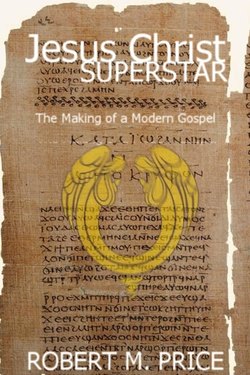Jesus Christ Superstar

Реклама. ООО «ЛитРес», ИНН: 7719571260.
Оглавление
Robert M. Price. Jesus Christ Superstar
Introduction: The Scandal of Superstar
Chapter One: The Eye of Faith Begins to Blink. Heaven on Their Minds
What's the Buzz
Strange Thing Mystifying
Everything's Alright
Chapter Two: High Priests and High Intrigue. Then We Are Decided
This Jesus Must Die
Chapter Three: A Jolly Good Fellow. Hosanna
Simon Zealotes
Poor Jerusalem
Pilate's Dream
Chapter Four: Righteous Riot. The Temple
Everything's Alright
I Don't Know How to Love Him
Chapter Five: Judas Priest. Damned for All Time
Blood Money
The Last Supper
Gethsemane
Chapter Six: Christ in Custody. The Arrest
Peter's Denial
Pilate and Christ
King Herod's Song
Chapter Eight: After the Deadline. Could We Start Again Please?
Judas' Death
Chapter Nine: King of Pain. Trial Before Pilate
Chapter Ten: Questions of the Hanged Man. Superstar
The Crucifixion
The Notes
Отрывок из книги
A Modern Gospel
What is a gospel? And why do I consider the rock opera Jesus Christ Superstar to be one? Isn't a gospel by definition one of the books of the Bible? If so, then nothing written in recent centuries could be counted as a gospel. This is because the "canon" of scripture (the official table of contents) was settled back in the fourth century AD. Who settled the matter? Who decided what writings should be included, excluded? Various synods of bishops meeting here and there in North Africa and Constantinople. Who gave them the authority to make such a decision? Keep in mind that the Bible is a book many people have lived by and died for, believing the book to be the written Word of God. But no one ever claimed that the voice of God suddenly rang out and told the bishops which books to include. Being an editor of fiction anthologies myself, I know this would make the selection process a lot simpler. But, no, like me, the bishops made their own judgment calls. Did they make the right choices? Some religious leaders tell us that we must simply accept their ancient editorial decisions as if the bishops were just as divinely inspired as the original Bible writers themselves were supposed to have been. This is quite ironic, since on all other matters the same clergymen will warn us to listen only to the Bible, not to the words of mere mortals--and yet it was the opinions of mere mortals like ourselves who determined what was Bible and what wasn't. 1
.....
This was in the days before the currency of Reader Response criticism. Since then it has become clear through the writings of Roman Ingarden (The Literary Work of Art), Wolfgang Iser (The Act of Reading; The Implied Reader), Stanley Fish (Is There a Text in This Class?), Umberto Eco (The Open Text), and others that the open-ended, open-textured character of literary texts compels the reader/viewer/hearer to fill in certain "zones of indeterminacy" left open by the author so that the reader becomes an active collaborator in producing the text as the reader experiences it. We could almost go so far as to say that if the text, the drama, were completely univocal, if there were a single intended definitive meaning visible to every reader/viewer, then the literary work would be merely a dead stone. There would be no real role for the reader save for passive reception, and this is not really reception at all. Good luck trying to get the catharsis of pity and terror (as Aristotle said) from a drama that is just dumped in front of you as a fait accompli.
Or think of a detective mystery. The whole point of this genre is to involve the reader as a silent rival of the investigator: the reader eagerly assembles a hypothesis using every fresh piece of evidence tossed him by the author, trying to figure out the ending in advance: "‘whodunit?" If the mystery writer cannot place the reader in this kind of suspense, the story has already crashed before it could take off. So the case of a mystery story well illustrates the crucial importance of indeterminacy precisely in order to make the story dramatic. And this much Hewes would probably not deny. He would rightly point out that any and every detective mystery story resolves itself. Sooner or later we discover the identity of the guilty party; the mystery is solved, and we can breathe freely again.
.....